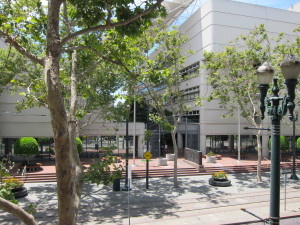By Sharon Simonson

SAN JOSE — A Chinese professor accused of espionage and trade-secret theft should smell the sweet air of freedom later today after spending nearly eight weeks imprisoned at the Santa Clara County Main Jail.
But Hao Zhang’s reprieve could be short and is definitely limited. He remains under threat of re-detention by the U.S. Department of Homeland Security, which has rescinded his tourist visa, and so long as he remains out of jail must stay all day every day at a monitored Mountain View home.
Over the objections of federal prosecutors, U.S. Magistrate Judge Nathanael Cousins ordered Zhang freed on a $500,000 bond. The bond is secured by $225,000 in U.S.-located retirement savings and other financial assets belonging to Zhang and his wife, as well as the equity in four Tampa, Fla., homes owned by Li Jiang, whose nephew is married to Zhang’s sister. The assets’ value totals nearly $625,000, Zhang attorney Thomas Nolan told the court.
Magistrate Cousins questioned Jiang, who spoke with the judge by telephone from Florida in open session, to ensure she understood the financial consequences should Zhang violate the terms of his orders. The federal government could seize her assets up to a total value of $500,000, the judge said. “You are putting your own financial security in the balance to assure Dr. Zhang will come to court and follow the orders of the court,” Cousins told Jiang. “You should only do that if you think he will. Do you understand?” Jiang said yes.
Cousins similarly admonished Zhang’s wife and Zhang himself in court on June 30, explaining that each was personally liable for the entire $500,000 bond should the defendant fail to follow the terms of his release or to appear in court when required. “Dr. Zhang, you could be held in custody for the remainder of this case, you could face additional charges and a long potential prison term,” Cousins said.
The judge ordered Zhang to remain at a Mountain View home with permission to leave only for medical purposes, meetings with his attorneys and court visits. Any other travel must be approved in writing by pretrial services but cannot carry him beyond the Northern District of California, the judge said. His whereabouts are to be monitored electronically by global positioning system. The judge also prohibited Zhang from having any contact with his five co-defendants outside the presence of his attorneys. All five are Chinese citizens; none of them has been arrested.
Zhang expressed no emotion in court in reaction to the judge’s decision, an outcome his attorneys have pursued since shortly after his arrest May 16 at the Los Angeles International Airport. In the moments before Judge Cousins entered the courtroom to begin today’s proceedings, Zhang sat alone to one side, staring unsmiling toward the floor, never making obvious eye contact with his 34-year-old wife, who sat in the courtroom’s front row, or any of his attorneys, his pallid face set off by his increasingly unruly black hair. As has been the case in all of his San Jose court appearances, Zhang wore the signature prisoners’ orange tunic of the Santa Clara County jail including leg irons and handcuffs. A U.S. marshal removed the cuffs for the court proceedings.
U.S. law enforcement boarded Zhang’s airplane upon its arrival from China to arrest the 36-year-old scientist, who earned a doctoral degree in electrical engineering from the University of Southern California in 2006. He along with five other Chinese citizens are accused of stealing trade secrets, for their own benefit and that of the Chinese government, from two semiconductor companies with Silicon Valley ties, Avago Technologies Ltd. and Skyworks Solutions Inc. In a dash of irony, among the financial assets Zhang offered to secure his release is a 401(k) retirement account related to his Skyworks employment.
(Photos by Sharon Simonson)